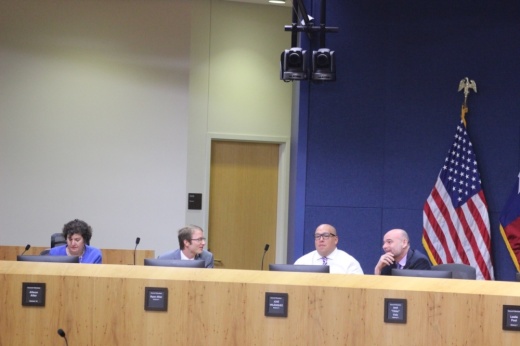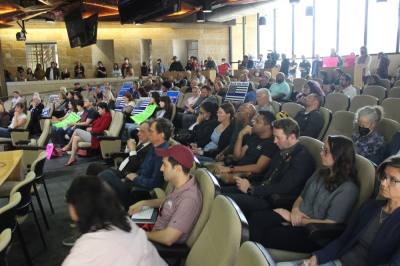The move came hours after council's vote to fire City Manager Spencer Cronk, due in part to his handling of the contract process as well as Austin's emergency management in the wake of Winter Storm Mara.
Debate over whether to sign off on a one- or four-year deal with the APA comes ahead of a May election featuring a pair of police oversight measures on the ballot. Officials, including District 4 Council Member Chito Vela, who sponsored the push to reopen negotiations for a one-year contract, said they backed the stopgap option instead of a longer-term agreement so city voters could decide the oversight issue before any new policy is in place.
Council had previously considered one-year negotiating frameworks created by Vela and Mayor Kirk Watson on Feb. 9 before postponing a final decision to this week. The discussions come with just over a month remaining until the current APA contract expires March 31.
Contract deliberations
Austin's police labor agreements are typically negotiated on a four-year basis, and talks to draft a new contract began early last year.
The process was complicated last summer when a petition for a range of police oversight measures from the criminal justice group Equity Action secured a place on the ballot, given that many of its oversight provisions require APA approval through the contract process and some are viewed by city staff as conflicting with state law.
Additionally, the APA financially supported a separate group—Voters for Oversight and Police Accountability—which also successfully petitioned to place another policing policy question on the ballot. Both proposals are called the "Austin Police Oversight Act," with the first from Equity Action now labeled as Proposition A on the May ballot, while the second from VOPA is Proposition B.
Vela and others on council said their actions in pursuit of a placeholder one-year deal were inspired by a desire to allow city voters to decide on a police oversight framework this spring, rather than enacting a different set of measures through a long-term police labor agreement.
Vela said he also would like to see the oversight act passed on its own by Austinites given his view that its contents would promote one of the more robust police oversight systems in the state and nationwide.
“For that reason, I think we have to check in with the voters before we do anything else. Let folks weigh this; let them think about it; let them vote," Vela said Feb. 15. "If the voters of Austin give us a direction and say, ‘You know what, we do want to lead the nation in police accountability and oversight,’ then so be it. We have our marching orders, and we’ll go out and get it done.”
Council votes
Scores of community members packed the council chambers Feb. 15 to weigh in on the contract debate as well as the broader issues of police accountability and public safety in Austin. Impassioned residents’ comments poured in for several hours, with feedback centered on both support and opposition to council’s one-year contract plan.
Residents brought up issues ranging from the May election and voters’ ability to weigh in on the issue; the legality of provisions of Proposition A and the council-proposed one-year contract option; incidents of police violence, such as the November killing of Rajan David Moonsinghe on his property; Austin’s police oversight systems; crime rates in the city; support for police officers; police staffing levels and potential retirements on the force; and how negotiations with the APA played out over the past year.
Council's vote to pursue a new one-year deal eventually passed in a 9-2 vote, with many officials sharing Vela's sentiments.
“I have no intention of circumventing the ballot measure process,” District 2 Council Member Vanessa Fuentes said. “I believe that people of Austin should expect safety and have safety in our community, and that our police officers should be held to the highest possible standard.”
District 10 Council Member Alison Alter represented one vote against the item. While stating her strong support for improving police oversight in Austin, she said that pushing off the APA-approved four-year framework and letting the election play out may not bring the intended results.
"What is unclear to me is whether we can achieve more oversight a year from now than what we already have on the table under a four-year deal," she said. "Our legal department has argued that the passage of a petition will not immediately result in strengthened oversight, because many of the oversight provisions are required by state law to be ratified by APA in a contract. So, negotiating for a one-year contract does not guarantee us strengthened police accountability. From my perspective, it does guarantee that we will end up spending more money on APD."
District 6 Council Member Mackenzie Kelly said she voted against over her concerns that a "disingenuous" promotion of an interim deal could hamstring the Austin Police Department's staffing efforts and hurt police-community relations.
“The proposed short-term extension can cause confusion and create the perception that the city is not committed to supporting its officers and the public safety of its residents,” Kelly said. “It will have negative impacts on the morale of the police force.”
In an interview after council's vote for his removal, Cronk told Community Impact he still believes the four-year deal is the best option for the city.
“The timing of where the last contract ended was really critical in how we might be able to ensure that we have the support and recruitment, retention efforts that are needed going forward balancing with an appropriate level of oversight," he said. "I felt like the four-year contract that we did negotiate provided that balance.”
Looking ahead
Despite council's push, it remains to be seen whether a new short-term deal will be agreed upon by the involved parties—and if it is, how the oversight measures in either May proposition would be rolled out.
APA President Thomas Villarreal previously said the union would not negotiate against itself, and that he opposed a new path forward after already reaching the conclusion of the extended labor talks that produced the four-year proposal.
Villarreal told Community Impact he had no firm expectation of the APA's next steps after council's Feb. 15 vote and will wait to detail an approach based on input from his association's board.
If a new agreement between the city and APA is not reached by March 31, certain provisions in the contract, including some tied to compensation, would be rolled back.
Ahead of council's vote, city labor negotiators also compiled a report responding to Equity Action's outline of the ballot measure. That breakdown also detailed several areas they believe legal conflicts could arise if voters end up passing the oversight act.
"Each person will have their own views about how much or how little the proposed agreement achieves, but that personal conclusion must be based on an understanding of what the city has the authority to change versus what we must negotiate and cannot dictate," the labor team wrote. "If a voter believes we must eliminate [private police personnel record-keeping] completely, they need to understand that the city cannot do that; the voters cannot do that; and the APA will not agree to do it."
Elle Bent contributed to this report.






